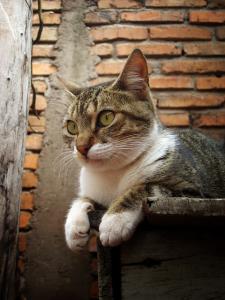Cystitis is a common complaint affecting cats. The term cystitis roughly translates to “inflammation of the bladder” and is sometimes referred to as Feline Urologic Syndrome (FUS) or Feline Lower Urinary Tract Disease (FLUTD). While most cases of human cystitis are a result of infection, cats are more prone to stress-induced cystitis.
Cystitis occurs when the urinary tract becomes inflamed and blocked. Urethral blockage can be the result of a bladder stone (urolithiasis), bacterial infection or a build up of struvite crystals. Most cats affected by cystitis suffer from ‘idiopathic interstitial cystitis’ or ‘sterile cystitis,’ meaning the cause of the complaint is unknown. If your cat has been experiencing stress for whatever reason (i.e. you have recently moved house, had building work carried out, or introduced a new addition to the household), alleviating the cause of the stress is the best starting point in addressing the problem.
Idiopathic interstitial cystitis affects 60-70% of cats suffering from the complaint. Abnormalities rarely show up on x-rays or ultrasounds, and urinalysis usually comes back clear of infection.
 In general, cystitis is a symptomatic illness. Most cats affected will exhibit one or a combination of symptoms, with the most common being frequent urination. Other symptoms include straining to urinate – often accompanied by ‘crying’ vocalisation – blood in urine, concentrated, odorous urine, and passing very little urine at a time. A cat with cystitis may also urinate in strange places having previously only urinated in the litter box, and may excessively lick its genitals. Clumping litter offers a good indication of how much urine your cat is passing as smaller clumps (and more of them) can suggest a problem. Regularly changing the type of cat litter you use is not recommended.
In general, cystitis is a symptomatic illness. Most cats affected will exhibit one or a combination of symptoms, with the most common being frequent urination. Other symptoms include straining to urinate – often accompanied by ‘crying’ vocalisation – blood in urine, concentrated, odorous urine, and passing very little urine at a time. A cat with cystitis may also urinate in strange places having previously only urinated in the litter box, and may excessively lick its genitals. Clumping litter offers a good indication of how much urine your cat is passing as smaller clumps (and more of them) can suggest a problem. Regularly changing the type of cat litter you use is not recommended.
While all cats are susceptible to cystitis, certain cats are more prone to it than others. Predisposing factors include age, weight and diet. Cats that are neutered/spayed at an early age are thought to be more at risk from developing cystitis, just as cats that are overweight, under-exercised and regularly fed a dry diet are.
Unlike dogs which are often described as omnivores, cats are obligate carnivores that struggle to digest vegetable protein. This means they need a high proportion of meat muscle protein in their diet to thrive. Moreover, the prey of cats in the wild consists of roughly 70% water, something that most wet canned foods provide (78%). This is compared to the 10% water that makes up dry kibble. Because of this, many cat owners believe that wet food is the best option for cats, especially those prone to recurrent urinary health problems. Wet food has also been claimed to reduce obesity when fed as a staple diet.
Cats are also notoriously bad at drinking water and therefore need to get all their hydration from their food. If a cat doesn't get enough water, it is more susceptible to struvite crystal formation. These crystals may be small but they can be uncomfortable, with sharp edges that often cause internal bleeding.
 The location of your cat's water bowl is an important factor in encouraging water intake and minimising stress as, in the wild, cats are most vulnerable to predators when they are eating, drinking and going to the toilet. If the feeding area and/or litter tray is in a particularly busy or noisy part of the house, your cat may feel threatened and eventually stop visiting it altogether. It is important that you provide enough litter trays to cater for all the cats in your household as this ensures that everyone has their own special place to use.
The location of your cat's water bowl is an important factor in encouraging water intake and minimising stress as, in the wild, cats are most vulnerable to predators when they are eating, drinking and going to the toilet. If the feeding area and/or litter tray is in a particularly busy or noisy part of the house, your cat may feel threatened and eventually stop visiting it altogether. It is important that you provide enough litter trays to cater for all the cats in your household as this ensures that everyone has their own special place to use.
Some cats are encouraged to drink with the use of a water fountain as this is something novel that captures the cat's interest and promotes regular visits.
So, what can be done to prevent feline cystitis?
Because most cases of cystitis are idiopathic (unknown cause), preventing it is difficult. The best advice is to take note of your cat's stress level and try to minimise upheaval and stressful situations as much as possible. Obviously, routine is always subject to change and holidays, furniture re-adjustments and domestic DIY cannot be avoided indefinitely.
As there is a strong correlation between stress and urinary health, VioVet has specially developed a supplement to treat both cause and effect; on one hand helping to reduce stress and related behaviours, and on the other, working to support and maintain normal urinary tract function and relieve discomfort.
FortiFlow contains a careful blend of ingredients chosen for their gentle but effective properties, such as N-acetyle glucosamine (not to be confused with other forms of glucosamine) which is often used to treat inflammatory conditions and may help protect the lining of the stomach and intestines. D-Mannose is a sugar thought to help prevent recurrent cystitis by binding to bacteria, and is found in cranberries and other berries, peaches, apples and some plants. Finally, the inclusion of L-Tryptophan - an amino acid precursor to neurotransmitters serotonin and melatonin - will help keep your cat calm, happy and contented.
To help relieve stress and promote a calm disposition, SettleMe chews contains a blend of ingredients believed to help support calm behaviours and reduce stress-related behaviours and over-activity. This is also available as a Calming Support Liquid for cats that my struggle taking a chew.
Feliway is an effective, pheromone-based product that helps to reduce stress and nervousness in cats and promotes confidence and calm instead. Available from VioVet as a diffuser, spray and non-prescription tablet, you can rely on Feliway to calm your feline in times of unavoidable disruption and stress.
Pain management is essential when dealing with feline cystitis. Antibiotics may be prescribed if a bacterial infection is suspected, although this is rarely the case in cats. Corticosteroids are sometimes given to reduce inflammation, along with pain killers to lower discomfort and pain. In severe cases, your veterinarian may conduct fluid therapy or catheterisation to relieve a blockage, while surgery is often performed on male cats to reduce the chance of blockage recurrence.
If you have had any experiences of caring for a cat with cystitis or would like to share advice with our other readers, please comment below! Email me directly with any further questions and/or suggestions for future blog posts: [email protected]
Written by: Hannah





